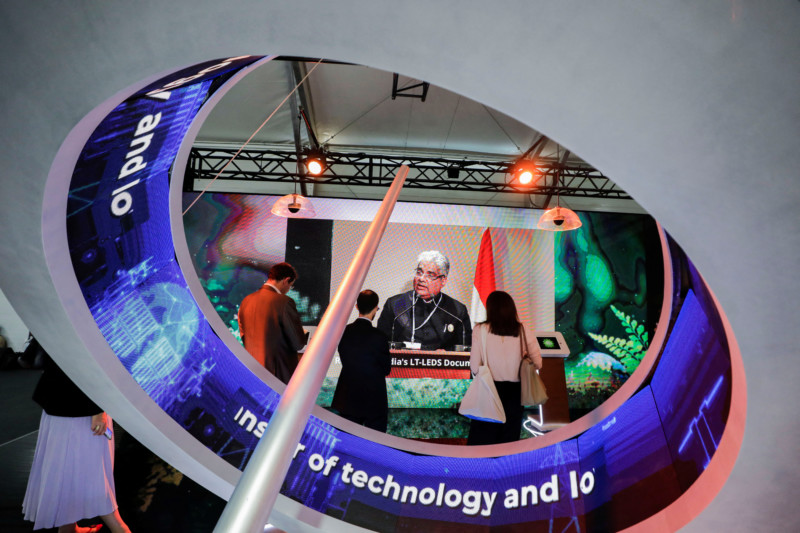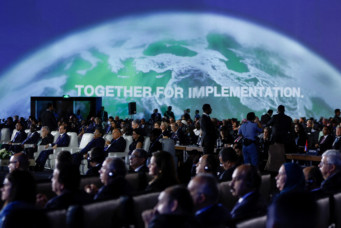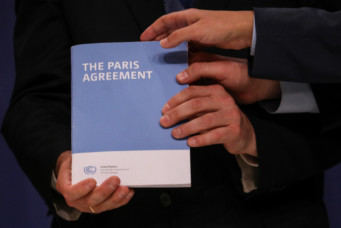Reflections on COP27: How Egypt and India Can Work Together
In the face of the global climate crisis, India and Egypt must continue to lead the Global South in pursuing equitable climate action and building on the outcomes of the twenty-seventh Conference of the Parties in Sharm El-Sheikh

People watch as India’s Bhupender Yadav reveals India’s long term emissions strategy, during the COP27 climate summit, in Sharm El-Sheikh, Egypt, Nov. 14, 2022. Mohamed Abd El Ghany/Reuters
Egypt played a pivotal and bridging role in delivering the long-overdue loss and damage fund, a planned fund to compensate vulnerable countries for loss and damage sustained due to climate change. The fact that it has taken three decades of the United Nations Framework Convention on Climate Change (UNFCCC) to come to this decision reflects the outcome’s importance, as well as the difficulty with which it was achieved. During COP27, India voiced the concerns of the Global South across various agenda items, and is proud to have supported Egypt and other like-minded developing countries in achieving the fund.
With most of the member states, particularly developing countries, still struggling with multiple recovery challenges from the COVID-19 pandemic, prevailing economic slowdowns, crises in fuel and food supply chains, and delays in progress toward achieving sustainable development goals (SDGs), COP’s theme “Together for Implementation” was both ambitious and challenging.
While the loss and damage fund may have captured much global attention, COP27 under Egypt’s leadership also successfully negotiated important aspects of climate action, including mitigation, adaptation, and climate finance. These efforts rectified the skewed emphasis on mitigation work programs in previous COPs which fell short of developing countries’ expectations. Given the constant efforts by some to shift the burden of responsibility for climate action toward developing countries, it will continue to require efforts from the latter, including India and Egypt, to preserve this balance.
The Sharm El-Sheikh Implementation Plan emphasizes the urgent need for immediate, deep, rapid, and sustained reductions in global greenhouse gas (GHG) emissions by parties across all applicable sectors. At the same time, it underlines that developed country parties need to urgently and significantly scale up their provision of climate finance, technology transfer, and capacity-building for adaptation so as to respond to the needs of developing country parties as part of a global effort. It aptly expresses serious concern that the commitment of developed countries to mobilize climate finance of 100 billion dollars per year by 2020 has not yet been met.
The largest share of historical and current global emissions of GHGs originated in developed countries, and the current per capita emissions in developing countries, such as India and African countries, are relatively low. For example, India, despite being home to around 18 percent of humanity, has contributed approximately 4 percent of global cumulative emissions from 1850 to 2019. In sharp contrast, just twenty-three developed countries are responsible for half of all historical CO2 emissions.
India, despite having significant energy needs in order to develop, is actively pursuing low-carbon development strategies. Today, India is the world’s third-largest producer of renewable energy with 40 percent of its installed electricity capacity coming from non-fossil fuel sources. India is progressively decoupling economic growth from greenhouse gas emissions.
According to the 6th Assessment Report of the Intergovernmental Panel on Climate Change (IPCC), Africa is one of the lowest contributors to GHG emissions, yet key development sectors have already experienced widespread losses and damages attributable to human-induced climate change, including biodiversity loss, water shortages, reduced food production, loss of lives, and reduced economic growth. In Africa more than any other region, agricultural productivity growth has fallen by 34 percent since 1961 due to climate change. Over 2.6 million and 3.4 million new weather-related displacements occurred in sub-Saharan Africa in 2018 and 2019, respectively. The IPCC report also mentions that annual finance flows targeting adaptation for Africa are billions of
U.S. dollars less than the lowest adaptation cost estimates for near-term climate change. Similar challenges exist for many developing countries across the world.
It is therefore imperative that developed countries take the lead in global climate action, including in the reduction of greenhouse gas emissions. For the world to achieve net zero emissions by 2050—and considering the historical emissions of the developed countries as well as the accepted legal principles of Equity, and Common But Differentiated Responsibilities and Respective Capabilities (CBDR-RC)—developed countries should reach net zero emissions well before 2050, while developing countries may take longer.
In fact, one significant outcome of COP27 is that the decisions adopted have taken into consideration the principles of the UNFCCC and the Paris Agreement, including climate justice, equity, and CBDR-RC. While the principle of CBDRRC, which is fundamental to the entire climate negotiations framework, should have been the default, there were serious attempts from some parties to dilute these principles and shift the burden of responsibilities for climate action.
Raising the COP27 Curtain on Other Outcomes
Among other major outcomes from COP27 are work programs for mitigation, just transition, and climate action in agriculture. On technology transfer, expectations have been raised with the launch of the first joint work program of the Technology Mechanism for 2023–2027, which aims to facilitate the transformational change needed to achieve the goals of the Convention and the Paris Agreement. Hopefully, the newly adopted work program on agriculture, true to its letter, will aim at safeguarding food security, ending hunger, and addressing vulnerability of food production systems from adverse impacts of climate change. On the Global Goal on Adaptation, established in the Paris Agreement, the implementation plan recognizes that adaptation is a global challenge faced at multiple levels and is a key component of global response to climate change. The COP27 decisions also capture the spirit of inclusive participation and recognize the important roles of non-state stakeholders in addressing and responding to climate change. Much to the delight of various sections of civil society, COP27 adopted the work program on Action for Climate Empowerment, which calls for meaningful engagement of youth in climate actions at all levels, facilitating the inclusive participation of children, women, indigenous peoples, and persons with disabilities, in climate action, according to national circumstances.
Another commendable takeaway from COP27 was the launch of an ambitious Executive Action Plan 2023-2027 for the “Early Warnings for All” initiative, aiming to provide access to early warning systems around the world by 2027. The COP27 decision rightly points out the existing gap that currently leaves one-third of the world, including 60 percent of Africa, without access to early warning services. India, which has always been committed to sharing its expertise for the benefit of partner countries in need, also joined the initiative. Early warning systems based on targeted climate services can be effective for disaster risk reduction, social protection programs, and managing risks to health and food systems.
The COP27 decisions, emphasizing the importance of transition to clean energy, clearly underline that a just and equitable transition should encompass pathways that take into consideration energy, socioeconomics, workforce, and other dimensions. India is also determined to implement an ambitious, just, equitable, and inclusive pathway to low-emission and climate-resilient development suitable to its national capabilities. As per India’s enhanced Nationally Determined Contributions submitted in August 2022, India stands committed to reducing the emissions intensity of its GDP to 45 percent below 2005 levels by 2030. India also is committed to achieving about 50 percent cumulative electric power installed capacity from non-fossil fuel-based energy resources by 2030 with the help of transfer of technology and low-cost international finance. During COP27 itself, on November 14, 2022, India submitted its “Long-Term Low-Carbon Development Strategy” to strive toward net-zero by 2070.
India’s Role at COP27
India has also undertaken global initiatives to fight climate change and its severe impact. Together with partner countries, India has pioneered initiatives like the International Solar Alliance and the Coalition for Disaster Resilient Infrastructure (CDRI) along with CDRI’s dedicated initiative of Infrastructure for Resilient Island States. India has also engaged in various bilateral and regional projects and capacity-building activities in developing countries, including in Africa, which directly or indirectly contribute to climate action. The India-UN Development Partnership Fund has supported, among other things, renewable energy and energy-efficient technologies, as well as the provision of training and workshops on utilization of these technologies to reduce carbon footprint and reverse climate change.
Just a month before COP27, a Mission “Lifestyle for Environment (LiFE)” was launched by Prime Minister Narendra Modi in the presence of the UN Secretary General. Mission LiFE is a global campaign which aims to promote sustainable lifestyles and encourage individuals across the world to undertake simple environment-friendly actions in their daily lives. The importance of sustainable lifestyles and sustainable patterns of production and consumption was a welcome inclusion in the COP27 cover decision.
As the Chair of the Group of Twenty (G20), India is committed to driving a consensus on a Green Development Pact of the G20 Leaders, which will be a blueprint of strong actions for the next decade powering green development all over the world. This will be through investments in sustainable lifestyle, leveraging green hydrogen for climate action, and accelerating progress on SDGs. Moreover, as Modi has stated, “India’s G20 priorities will be shaped in consultation with not just our G20 partners, but also our fellow travellers [citizens] in the Global South, whose voice often goes unheard.” In that spirit, India warmly welcomes Egypt as a guest country during India’s G20 presidency and looks forward to working closely with Egypt in putting forward the priorities of the Global South.
India’s G20 presidency amplifies the unheard voices, perspectives, and priorities of the Global South in G20 debates. In a show of commitment to South–South Cooperation, India organized the Voice of the Global South Summit as a platform for developing countries to share their concerns, perspectives, and priorities. Over 120 countries participated in this virtual summit on January 12–13, 2023. A session was devoted to the environment and was themed “Balancing growth with environment friendly lifestyles,” where participating countries shared their concerns and perspectives related to climate change and also exchanged experiences on climate actions. India stands with Egypt in solidarity with the Global South, and should continue to lead the demand for the fulfillment of climate finance obligations by developed countries.
The bilateral partnership between India and Egypt is time-tested and multifaceted, and this year marked the 75th anniversary of the establishment of diplomatic relations. In honor of the momentous occasion, Egyptian President Abdel Fattah El-Sisi concluded in January 2023 his state visit to India, during which he graced India’s 74th Republic Day as Chief Guest. The two leaders decided to elevate the relationship to a “strategic partnership,” bringing further momentum and robustness to the mutual ties in times to come.
India, which has been a solution provider in many global issues as evident in the context of the COVID-19 pandemic, recognizes that climate change is a global collective action problem. It is, therefore, committed to engaging in multilateral negotiations actively and in a forward-looking manner toward preserving an effective, cooperative, and equitable global architecture based on climate justice and the principles of equity and CBDR-RC. At the same time, India will continue to voice the genuine requirements of developing countries while working closely with like-minded developing countries such as Egypt, striving for an equitable carbon and development space to achieve sustainable development and the eradication of poverty.
Looking beyond, India looks forward to meaningful progress with respect to climate finance and the new collective quantified goal. The Sharm El-Sheikh Implementation Plan encourages cooperation under technology mechanisms, and India looks ahead to operationalizing technology transfer and ensuring access to technology for developing countries, thereby mainstreaming the importance of a shift to sustainable and environment-friendly lifestyles.
Sanjay Verma is Secretary (West) in India’s Ministry of External Affairs. He joined the Indian Foreign Service in 1990, and has since served as ambassador to Spain and Andorra; Ethiopia; Djibouti; and the African Union, among other roles. On Twitter: @SanjayVermalFS.
Read More



